Abraham Marries Keturah
Genesis 25 records the deaths of both Abraham and Ishmael, as well as the births of Jacob and Esau, and the purchase of the most expensive bowl of stew in history.
First, though, we learn about Abraham’s “other wife” Keturah. Scholars are divided about whether Abraham married Keturah before or after Sarah’s death.
She is listed elsewhere in the Bible as a concubine. Abraham’s sons through Keturah (a concubine, 1 Chr. 1:32). Verse 6 seems to confirm this.
Thus she was a lesser wife of lower status than Sarah, one who did not enjoy the full privileges of a wife in the home, became the progenitors of various Arab tribes to the east of Canaan. Once again God records marital irregularities that He never approved.
Genesis 25:1-4 KJV
[1] Then again Abraham took a wife, and her name was Keturah.
[2] And she bare him Zimran, and Jokshan, and Medan, and Midian, and Ishbak, and Shuah.
[3] And Jokshan begat Sheba, and Dedan. And the sons of Dedan were Asshurim, and Letushim, and Leummim.
[4] And the sons of Midian; Ephah, and Epher, and Hanoch, and Abida, and Eldaah. All these were the children of Keturah.
Genesis 25:1 KJV
Then again Abraham took a wife, and her name was Keturah.
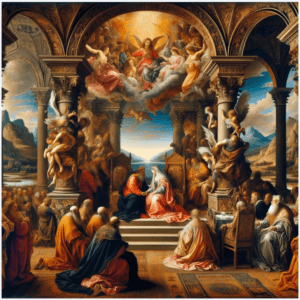 Bible interpreters disagree about when Abraham married Keturah, his “other wife.” Does the text mention this marriage here because it came after Sarah’s death, as has been traditionally understood?
Bible interpreters disagree about when Abraham married Keturah, his “other wife.” Does the text mention this marriage here because it came after Sarah’s death, as has been traditionally understood?
This is possible, but ancient literature was not written in the same chronological sense as modern history. The other, more likely possibility is that Abraham married Keturah before Sarah died.
All the days, even of the best and greatest saints, are not remarkable days; some slide on silently; such were these last days of Abraham.
Now he has quite a family. He had his biggest family after the death of Sarah. Somebody will raise the question, “I thought that at the time of the birth of Isaac Abraham was dead as far as his capability of bringing a child into the world.” Granted, he was.
But when God does something, He really does it. This is the reason I believe that anything God does bears His signature. Right here we see that this man Abraham was not only able to bring Isaac into the world, but he now brings in this great family of children.
Given that Abraham had six children with Keturah, it seems more likely that theirs was an ongoing relationship, not one which did not even start until Abraham was nearly 140 years old (Genesis 23:1–2; 17:17).
The text is not clear as to which of these two options is the truth. In 1 Chronicles 1:32, Keturah is described as Abraham’s concubine. In any case, the following verses will reveal that Abraham had six sons with Keturah.
None of them were included in the covenant promises given by God to Abraham and then Isaac.
Genesis 25:2 KJV
And she bare him Zimran, and Jokshan, and Medan, and Midian, and Ishbak, and Shuah.
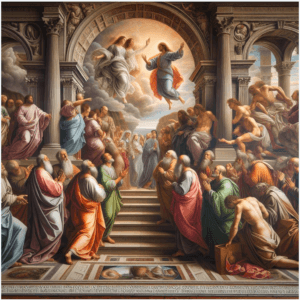 God had promised to make Abraham the father of many nations (Genesis 17:4). He will clearly become the father of Israel through Isaac and his descendants.
God had promised to make Abraham the father of many nations (Genesis 17:4). He will clearly become the father of Israel through Isaac and his descendants.
Abraham also fathered several nations and tribes through Ishmael, his son by Sarah’s servant Hagar (Genesis 25:13–16).
This verse reveals six more sons, all by Abraham’s wife Keturah: Zimram, whose people may have settled in Arabia, Jokshan, Medan, Midian—whose descendants become traders in the deserts around Israel; Moses’s wife will be a Midianite—as well as Ishbak, namesake of a town in northern Syria, and Shuah, the name of a town near Babylon.
Clearly God kept his promise to make many nations from His much-blessed servant Abraham, as the following verses will continue to reveal. Here is an account of Abraham’s children by Keturah, and the disposition which he made of his estate.
The interesting thing that we have before us here is the mention of Medan and Midian. The other boys will have nations come from them also, but I can’t identify them. I’m not interested in them because they do not cross our pathway in Scripture, but Midian does.
We will find later that Moses will go down into the land of Midian and take a wife from there. Remember that the Midianites are in the line of Abraham and so are the Medanites.
So we find here the fact that there are other sons of Abraham, but the Lord has said it is through Isaac that Abraham’s seed is called—not through any of these other sons. It is not through Ishmael, nor through Midian, nor Medan.
All of these were nomads of the desert.
Genesis 25:3 KJV
And Jokshan begat Sheba, and Dedan. And the sons of Dedan were Asshurim, and Letushim, and Leummim.
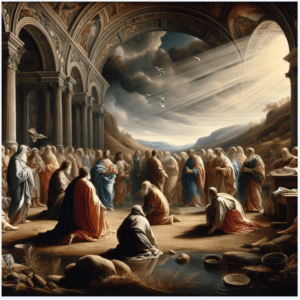 This verse continues to describe Abraham’s descendants with his wife Keturah. Interpreters are split over whether this marriage occurred before or after the death of Abraham’s first wife, Sarah (Genesis 23:1).
This verse continues to describe Abraham’s descendants with his wife Keturah. Interpreters are split over whether this marriage occurred before or after the death of Abraham’s first wife, Sarah (Genesis 23:1).
Given Abraham’s advanced age at the time of Sarah’s death, it seems more likely that he’d fathered children with Keturah before Sarah had passed away. Jokshan, the son of Abraham and Keturah, fathered Sheba and Dedan.
Dedan fathered Asshurim, Letushim, and Leummim. The fact that their names are included in this list may indicate that their peoples became known in the region, though little is known about them now.
Though these descendants came from Abraham, it’s important to remember that all of Abraham’s great wealth and, more importantly, God’s blessing and the covenant promises, were handed down to Isaac, his son with Sarah (Genesis 25:5).
Genesis 25:4 KJV
And the sons of Midian; Ephah, and Epher, and Hanoch, and Abida, and Eldaah. All these were the children of Keturah.
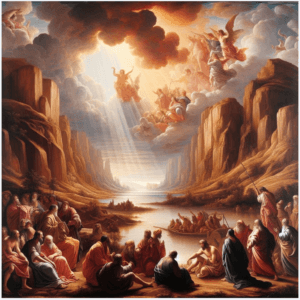 This verse lists the sons of Midian, one of Abraham’s six sons with Keturah. According to this chapter, Abraham had married Keturah, but Scripture does not specify whether they were married before or after the death of Sarah (Genesis 23:1–2).
This verse lists the sons of Midian, one of Abraham’s six sons with Keturah. According to this chapter, Abraham had married Keturah, but Scripture does not specify whether they were married before or after the death of Sarah (Genesis 23:1–2).
The Midianites became a well-known people group and played a role in the history of Israel. Apparently occupying the deserts around Israel, Midianite traders would later sell Joseph to Potiphar in Egypt (Genesis 37:36).
Moses would marry Zipporah, the daughter of a Midianite man named Reuel (Exodus 2:20–21), also known as Jethro (Exodus 18:1–4). Unfortunately, the Midianites would eventually become another of Israel’s enemies in the region.
I hope that you have really enjoyed this post,
Please Leave All Comments in the Comment Box Below ↓

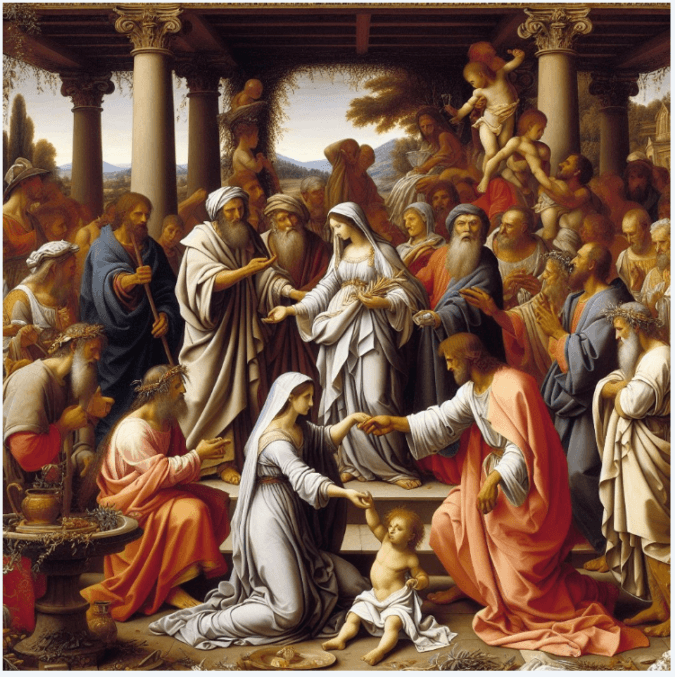











I greatly appreciated your thorough analysis of Genesis 25, focusing on Abraham’s marriage to Keturah and the subsequent genealogical details.
Your exploration of this often-overlooked passage provides valuable insights into the complex family dynamics and historical context of the biblical narrative. As someone who has always been fascinated by the intricate genealogies in the Bible, I found your explanation of Abraham’s descendants through Keturah particularly enlightening. It’s remarkable to see how God fulfilled His promise to make Abraham the father of many nations, not just through Isaac and Ishmael, but also through the children of Keturah.
One aspect that stood out to me was the connection you drew between these genealogies and later biblical events, such as Moses marrying a Midianite woman. It’s fascinating to see how these family lines intersect throughout biblical history, adding depth and context to the overall narrative.
I’d love to engage further with this topic and have a few questions for you:
1. How do you think the presence of these additional sons and their descendants affected the dynamics between Isaac and Ishmael?
2. Given that Keturah is referred to as both a wife and a concubine in different passages, how might this impact our understanding of family structures in ancient Near Eastern cultures?
3. In your opinion, what significance might the detailed genealogies of these “secondary” lines have for readers today?
4. How do you reconcile God’s apparent acceptance of Abraham’s multiple marriages with the biblical ideal of monogamy?
Thank you again for sharing this insightful study. Your work helps bring these ancient texts to life and encourages deeper reflection on their meaning and relevance. I look forward to reading more of your biblical analyses in the future.
Gratefully,
Eric
Hello Eric,
I am definitely glad you stopped by to engage with this HBS & DwJ platform.
Before Abraham died he gave gifts, probably from his vast wealth, to each of these sons and sent them away from Isaac. Abraham was intent that Isaac remain in the promised land of Canaan and that there be no confusion, even after his death, about exactly who Abraham’s sole heir was. To that end, Abraham sent all of these other sons away to the desert regions east of what would later become Israel.
The dual references to Keturah as both a wife and a concubine reflect the complex family structures in ancient Near Eastern cultures. This duality suggests that the roles of women could vary based on social status, economic factors, and familial needs.
Hierarchy and Status: The distinction between wives and concubines often indicated different social statuses. Wives typically held a higher status and more rights, while concubines had a secondary role, often serving to bear children when wives were unable to do so.
Inheritance and Lineage: Keturah’s children, like those of concubines, could still hold significant roles within the family lineage. This indicates that lineage could be complex and not solely dependent on the status of the mother.
Cultural Flexibility: The fact that Keturah is referred to in both ways suggests a degree of flexibility in marital arrangements and family structures. This could reflect the adaptive nature of familial relationships in response to socio-economic conditions.
Economic Considerations: Concubinage often had economic implications, such as producing heirs and expanding family resources. This indicates that marriage arrangements were sometimes strategic and based on family survival and prosperity.
Social Norms and Practices: The different titles attributed to Keturah can also shed light on social norms regarding women’s roles and expectations. It highlights how women could occupy various roles within a household, impacting their agency and influence.
Overall, Keturah’s classification invites deeper exploration into the nature of relationships, familial roles, and societal values in ancient Near Eastern cultures.
The detailed genealogies of Abraham’s children through Keturah and Hagar hold several significant implications for readers today:
Inclusion and Diversity: These genealogies highlight the importance of inclusivity and recognize diverse family lineages. This can encourage modern readers to appreciate the richness of different backgrounds and heritages.
Complexity of Relationships: The secondary lines illustrate that family structures can be intricate and multifaceted. This may resonate with contemporary readers who navigate blended families or non-traditional relationships.
God’s Promises: The genealogies serve to show that God’s promises extend beyond a single line, suggesting that blessings and divine purpose can manifest through multiple descendants. This can inspire readers to see value in all aspects of life, not just primary narratives.
Cultural Context: Understanding these genealogies provides insight into ancient Near Eastern culture, illustrating how societal norms around lineage and inheritance operated. This context can enrich readers’ comprehension of the biblical narrative.
Legacy and Impact: The mention of Abraham’s other descendants reminds readers that one’s legacy can be broader than commonly recognized. It invites reflection on how one’s actions and relationships influence future generations.
Faith and Identity: The genealogies can prompt discussions about faith and identity, as readers consider how different lines of descent contribute to the larger story of faith in diverse communities.
Overall, these genealogies invite a deeper exploration of family dynamics, community, and the unfolding narrative of faith, making them relevant for readers today.
Reconciling God’s acceptance of Abraham’s multiple marriages with the biblical ideal of monogamy involves several key considerations:
Cultural Context: In ancient Near Eastern societies, polygamy was common and culturally accepted. The biblical narratives reflect the norms of their time, showing how God interacted with people within their cultural framework.
Progressive Revelation: The Bible presents a progressive revelation of God’s will. While earlier figures like Abraham had multiple marriages, later texts emphasize monogamy, particularly in the New Testament. This suggests a gradual unfolding of God’s ideals.
Human Imperfection: Many biblical figures, including Abraham, exhibited flaws and made choices that didn’t align perfectly with God’s ideal. Their stories often illustrate human struggle and the complexities of faith, demonstrating that God can work through imperfect situations.
Purpose and Promise: God’s covenant with Abraham included specific promises about his descendants. The need for heirs and lineage may have influenced the acceptance of multiple marriages, showing God’s prioritization of His covenantal purposes over strict adherence to an ideal.
Final Authority of Christ: In the New Testament, Jesus reaffirms monogamy, pointing back to creation (Genesis 2:24) as the divine ideal. This establishes monogamy as the intended standard for Christian relationships moving forward.
Lessons from the Narrative: The stories of Abraham’s relationships often come with consequences and challenges, which serve as cautionary tales. These narratives illustrate that God’s acceptance doesn’t equate to endorsement, encouraging readers to seek His intended design.
Overall, understanding these factors can help reconcile the apparent tension between God’s acceptance of polygamy in certain contexts and the biblical ideal of monogamy.
I know this is an abundant amount of information, but hopefully your questions are answered in completion with these detailed explanations.
Please stop by again,
Blessings My Friend!
It’s truly remarkable to see how God fulfilled His promise to make Abraham the father of many nations, not just through Isaac and Ishmael but also through the children of Keturah.
Thank you for sharing this insightful study. Your expertise and dedication to bringing these ancient texts to life is truly commendable. Your work is a magnificent reflection on their meaning and relevance. I can hardly wait for more of your texts.
Thank you so much for your comment.
Your description of your perception of this study is the exact reason I created HBS & DwJ. My aim is to touch people in the most meaningful ways. In my opinion, GOD is the only way. I depend on Him each and every moment of my life on this earth.
Your article is well-written and easy to understand, as it very clearly provides an insightful analysis of Genesis 25, highlighting key themes and characters.
Here are some views on the points discussed:
The article notes the scholarly debate regarding the timing of Abraham’s marriage to Keturah. This ambiguity adds to the complexity of Abraham’s family dynamics and underscores the challenge of interpreting ancient texts with limited contextual.
The article emphasizes that the Bible records, but does not necessarily endorse, the marital practices of its characters. This is a crucial point, as it underscores the difference between descriptive and prescriptive texts in the Bible. The recording of these “marital irregularities” serves as a historical account rather than a moral endorsement.
Deaths of Abraham and Ishmael
Abraham’s death marks a significant transition in the narrative, passing the covenantal promise to the next generation. His burial alongside Sarah in the cave of Machpelah reinforces the importance of family heritage and the fulfillment of divine promises.
The brief note on Ishmael’s death highlights the distinction between the primary narrative focus on Isaac and Jacob and the secondary mention of Ishmael’s line. This mirrors the biblical emphasis on the chosen line through Isaac, while still acknowledging Ishmael’s role in the broader Abrahamic family.
The birth of Jacob and Esau introduces themes of sibling rivalry and the complex dynamics of birthright and blessing. These themes are foundational to the unfolding narrative of the Israelite nation
The chapter underscores God’s sovereignty in working through imperfect human situations to fulfill His promises. The genealogies and transitions between generations demonstrate God’s faithfulness in maintaining His covenant with Abraham’s descendants
The narrative reveals the complexities and imperfections of the patriarchs, providing realistic portrayals of their lives. These stories offer moral and theological lessons while reflecting the historical and cultural contexts of the time.
Conclusion
The article effectively highlights the key elements of Genesis 25, providing a nuanced understanding of the chapter’s significance. It addresses the complexities of Abraham’s family dynamics, the fulfillment of divine promises, and the moral lessons embedded in the narrative.
The discussion offers valuable insights into the broader themes of God’s sovereignty, human imperfection, and the unfolding of the covenantal promise through successive generations.
Hello Aparna,
Thank you so much for your thoughtful and detailed feedback!
I’m thrilled to hear that the article resonated with you and provided clarity on Genesis 25. Your insights into the scholarly debates, the distinction between descriptive and prescriptive texts, and the thematic elements of sibling rivalry and divine sovereignty are spot-on.
It’s gratifying to know that the analysis captured the complexities of Abraham’s family dynamics and the broader narrative themes effectively. Your reflections add valuable depth to the discussion, and I appreciate your engagement with the material.
Thank you again for your kind words and for sharing your perspective!
Blessings My Friend!
Hi, thank you for the very interesting article about Abraham and his life and family.
I tend to agree that he was married to Sarah while he had his second illegitimate family because of the fact that his lineage was passed down through Isaac and not any of his other sons. I find the Old Testament interesting in that it gives insight into man’s history.
Thanks again for your thorough exploration of Abraham and his sons.
Hello Lyn,
Thank you for your thoughtful feedback!
I’m glad you found the article on Abraham and his family intriguing. You’re right; the Old Testament offers a fascinating glimpse into historical and familial dynamics. The focus on Isaac and the lineage through him is a key aspect of understanding the broader narrative.
If you have any more questions or thoughts about the topic, I’d love to hear them!
Blessings My Friend!
HI!
Thank you for this insightful exploration of Genesis 25. It’s fascinating to see how the text provides layers of complexity in Abraham’s life, particularly through his marriage to Keturah and the subsequent children. The distinction between Keturah as a concubine versus a wife adds to the ongoing discussion about Abraham’s later years and the fulfillment of God’s promise to make him the father of many nations.
It’s also interesting to consider how these descendants, although not part of the covenant, played significant roles in the broader biblical narrative. The link between the Midianites and later events in Israel’s history, such as Moses’s marriage to Zipporah, underscores how interconnected these ancient families were.
I have often wondered about why the text doesn’t explain how Abraham had all these other children without any problems, yet Isaac was considered a miracle from God. I thought perhaps it was really because Sarah was past child-bearing years, perhaps had even reached menopause, so she couldn’t bear children.
The ongoing debate over the timing of Abraham’s marriage to Keturah highlights the challenges of interpreting ancient texts and the cultural differences in recording history. Whether Keturah came into Abraham’s life before or after Sarah’s death, her children certainly contributed to the fulfillment of God’s promises in ways that extended beyond Isaac’s lineage.
Overall, this post provides a thought-provoking look at how God’s plans unfolded through Abraham’s extended family, revealing the intricate tapestry of relationships and destinies that shaped the biblical world.
– Scott
Hello Scott!
Thanks for your thoughtful response!
You’ve touched on some intriguing aspects of Genesis 25. The complexity of Abraham’s family, particularly with Keturah, really does add depth to our understanding of his legacy and the fulfillment of divine promises.
I share your curiosity about why Isaac’s birth is highlighted as a miracle, especially in light of the other children Abraham had. Your point about Sarah’s advanced age is key—her infertility is often emphasized to underscore the miraculous nature of Isaac’s birth. It’s fascinating how the text focuses on Isaac as the child of promise, even while acknowledging the broader impact of Abraham’s descendants through Keturah.
The interplay between these narratives indeed reflects a rich and intricate historical and theological tapestry. The debate over the timing of Keturah’s marriage also underscores the challenges of reconciling historical details with theological themes. It’s a reminder of how interconnected these stories are, and how they contribute to the broader biblical narrative.
I’m glad you found the post engaging, and I appreciate the depth of your reflection on these complex issues!
Thanks again for your time,
Blessings My Friend!